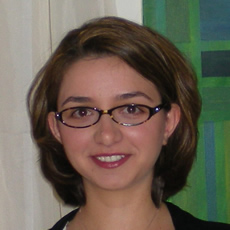TRI's Serra Acar Appointed as DEC Recommended Practices Ambassador for Oregon
October 13, 2016

TRI's Serra Acar, Ph.D. will serve as a
statewide “ambassador” to spearhead use of new recommended practices for the
care and education of young children with disabilities throughout Oregon. Acar, project coordinator for The
Research Institute at Western Oregon University, joins a select group of 16 experts
chosen by the Early Childhood Technical Assistance Center (ECTA) at the Frank
Porter Graham Child Development Institute.
The Early Childhood Technical Assistance Center (ECTA Center) was charged with assisting the Division for Early Childhood (DEC) and the DEC Commissioners in revising the Recommended Practices. The ECTA Center was also charged with developing products that would promote the use of the Recommended Practices, and with providing intensive Technical Assistance to states to help implement the Recommended Practices.

“We hand-picked the ambassadors for their broad expertise and skills,” said Joan Danaher, associate director of the ECTA. “They form a national cohort with knowledge of evidence-based practices, professional development and training, and their state’s early childhood services and practitioner networks.”
Danaher explained that ambassadors will serve as an extension of the ECTA Center, disseminating information and providing training within their states. Not only will ambassadors collaborate with one another to develop and share strategies and resources, but each will develop and implement goals aligned with a state improvement effort.
“As part of this inaugural group of ambassadors, Serra Acar will also participate in designing, documenting, and making recommendations for subsequent groups as we continue to disseminate materials nationally,” said Danaher.

The Division for Early
Childhood (DEC) of the Council for Exceptional Children developed the
Recommended Practices to provide guidance to practitioners and families about
the most effective ways to improve learning outcomes and promote the
development of young children, birth to age 5, who have or are at-risk for
developmental delays or disabilities.
Danaher said that through a cooperative agreement with the Office of Special Education Programs at the U.S. Department of Education, the ECTA Center has developed a suite of products for practitioners and families to learn how to apply the Recommended Practices to developmental interventions in everyday routines and settings involving children and families. All of the products and resources are free, including popular videos starring “aRPy,” an animated spokesperson created by the ECTA Center.
Acar and her fellow “aRPy Ambassadors” are based in state and local agencies and universities. They will receive support for their roles from state programs for children with disabilities birth through age 5 under the Individuals with Disabilities Education Act.
“I’ll collaborate with the other aRPy Ambassadors to develop and share strategies and resources on ECTA Center’s new products to support Recommended Practices,” Acar said. “I believe these products will be very helpful across Oregon for early intervention and early childhood special education practitioners, as well as for families who have young children.”
The aRPy Ambassadors will debut at the DEC International Conference in Louisville, Kentucky, on October 18.
Here's a video that tells you more about the aRPy Ambassadors.
Recent News Items
Closing the Achievement Gap Through STEM Education Nov 18, 2016
TRI Staff Members Present at NAEYC Conference in Los Angeles Nov 10, 2016
Three More Years for Campus Against Sexual Assault Program Nov 9, 2016
TRI's Serra Acar Appointed as DEC Recommended Practices Ambassador for Oregon Oct 13, 2016